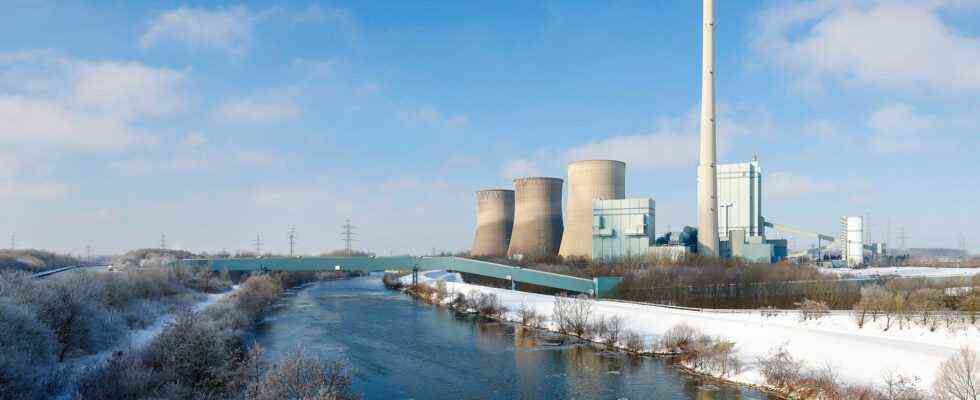Status: December 6th, 2021 5:00 p.m.
Experts say that new gas-fired power plants would have to be built in Germany because of the early coal phase-out sought by the Ampelkoalition. A tenfold increase in capacities is necessary. Is that feasible?
The energy plans of the traffic light coalition are putting Germany’s utilities under pressure. Experts and representatives of the energy industry warn that there could be a power shortage if the phase-out from coal came as early as 2030. This is “ideally” aimed at in the coalition agreement between the SPD, the Greens and the FDP. The massive expansion of renewable energies will then not be enough – especially not on days when there is little wind and no sun shines.
Warning of a power shortage
“When coal and atomic energy go completely offline, there is a gigantic gap that has to be filled,” says e.on boss Leonhard Birnbaum. This is only possible with a source that delivers reliably: gas. Birnbaum sees no short-term alternative to gas-fired power plants. The industry also regards gas-fired power plants as an indispensable transition technology for the energy transition. The Federation of German Industries (BDI) has repeatedly emphasized in recent months that new gas-fired power plants are necessary to guarantee security of supply.
Accordingly, in addition to renewable energies such as sun and wind, the future government is focusing on building new gas-fired power plants. The only condition: They have to be “H2-ready”, which means that they have to be able to be converted to operation with green hydrogen later. “Without new gas-fired power plants as a bridging technology, we run into a blackout risk despite all our efforts to expand renewables,” warns Andreas Pinkwart (FDP), Minister for Economic Affairs of North Rhine-Westphalia.
23 gigawatts additionally required
The Energy Industry Institute (EWI) at the University of Cologne has now determined how high the demand is. According to EWI expert Max Gierkink, new capacities of 23 gigawatts must be created by 2030. In purely mathematical terms, that would correspond to the output of 23 nuclear power plants. The BDI sees an even greater need. President Siegfried Russwurm believes the construction of gas-fired power plants with an output of 43 gigawatts is necessary by 2030.
The energy industry is still miles away from such goals. The Federal Network Agency is currently planning an expansion of just 2.3 gigawatts by 2023. In order to achieve the climate goals of the upcoming traffic light government, capacities would have to be increased tenfold by 2030. “This is a feat of strength,” says EWI researcher Gierkink.
Suppliers and plant manufacturers are under pressure to act. You now have to start building new power plants quickly. Because the planning and construction of new projects can take years. “There is not much time left,” warns Kerstin Andrae, General Manager of the Federal Association of German Energy and Water Management BDEW, in the “Handelsblatt”. “Anyone who wants to phase out coal must not oppose new hydrogen-capable gas-fired power plants.” It must be ensured that these power plants are actually built.
RWE wants to expand gas power plant capacities
The first suppliers have reacted and are ready to invest in new gas-fired power plants. RWE wants to build at least 2000 megawatts of gas power plant capacity by 2030. It would be conceivable to build the systems on the Group’s old coal-fired power plant sites. With a capacity of 14 gigawatts, RWE has the second-largest fleet of gas-fired power plants in Europe. The southwest German utility EnBW is also examining whether three important coal-fired power plants can be converted to natural gas and then later to climate-neutral gas. STEAG also wants to investigate a possible conversion of the hard coal-fired power station Walsum 10 in Duisburg to natural gas.
Small, decentralized systems would be a quicker alternative. “Instead of focusing exclusively on new large-scale gas-fired power plants, the planning and approval processes of which take years, decentralized combined heat and power plants based on cogeneration can be quickly and easily integrated into existing infrastructures,” says 2G Energy specializes in such systems. The planning times for decentralized cogeneration projects are between two and eight months.
Call for politics
The head of Siemens Energy, Christian Bruch, now sees politics on the train. “Now it is important to implement the plans quickly and to create the conditions for private investment in the renovation,” he demands. EWI researcher Gierkrink advocates state incentives for the massive expansion of gas-fired power plants. “The market conditions do not currently allow the addition of 23 GW.”

